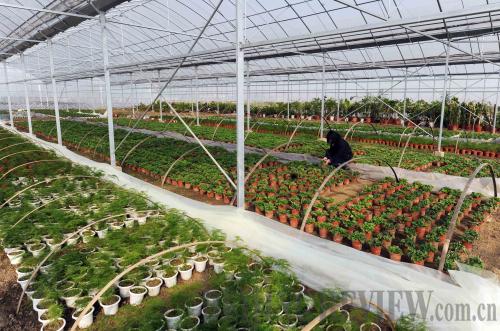|
 |
|
RURAL WEALTH: Farmers plant flowers in a greenhouse in Tongli Town, Jiangsu Province. The province aims to push forward modern agriculture in a bid to increase farmers' income (CHEN QI) |
Meanwhile, the province will spare no effort to ensure food supplies and hold serious inflation at bay, said Mao Weiming, Deputy to the 11th NPC and Director of the Jiangsu Provincial Development and Reform Commission.
"Those favorable policies may put pressure on our budget flexibility, but it is well worth the effort given its far-reaching implications," said Zhang Weiguo, Deputy to the 11th NPC and Vice Governor of Jiangsu Province.
The policies are bound to translate into higher business productivity and warm up the consumer market by removing the anxiety making the residents prone to save, he said.
Daunting challenges
Jiangsu's significant campaign was not without difficulties. Natural resource strains have always been an ailment concerning the province. More disturbing, though, is the fact that the economy of north Jiangsu lagged, while the south shined in part due to its proximity to Shanghai.
The Yangtze River divides Jiangsu into northern and southern parts. The five cities in the north—Xuzhou, Huai'an, Yancheng, Lianyungang and Suqian—account for 52 percent of the province's area and 44.5 percent of its population, but only around 20 percent of the province's GDP.
"Our top priority now is to bridge the regional gap and breathe fresh life into development of north Jiangsu, especially the poorer rural areas," said Luo.
A series of powerful measures have been put in place, including infrastructure construction, capital support and technology transfer, he said.
"The stiff efforts are paying off as growth rates of the northern area have outpaced the southern part," he said.
"Meanwhile, many manufacturers in the south are moving north to take advantage of the lower labor and land costs," said Luo. "Despite a strong need for growth, the northern cities must shut the doors to polluting and energy-depleting industries."
Miao Ruilin, Deputy to the 11th NPC and Mayor of Suqian, a city in north Jiangsu, said it's necessary to press ahead with modern agriculture and propel rural prosperity.
In 2010, the province's high-yield and high-efficiency agricultural acreage was 1.8 million hectares, making up one third of the total arable land.
The experience of 53-year-old Wang Sumei, a farmer in Weiying Town, Suqian, is one of the rags-to-riches stories happening in rural north Jiangsu.
Like her fellow villagers, Wang did back-breaking labor on the fields and lived a dirt-poor life. The turning point came in October 2009 when the local government initiated a program, which helped farmers plant quality strawberries in greenhouses.
"My husband and I contracted more than 10 greenhouses, and each could rake in profits of at least 10,000 yuan ($1,539) annually," she said. "Moreover, the yield is on the rise as the government helped introduce quality seeds and advanced planting technologies."
Innovative player
As it pledges a better life for residents, the provincial government is pushing its manufacturing machines into new gear.
For many low-end manufacturers, restructuring has become a necessity rather than an option, said Li Xueyong, Deputy to the 11th NPC and Governor of Jiangsu Province.
"The economic slowdown two years ago came as a strong catalyst for them to improve technological expertise and product quality and enhance energy efficiency to cut costs," Li said. "A boost in profitability will also allow the companies to bump up compensations for their employees."
Over the next five years, Jiangsu will put the focus on six emerging industries—new energy, new materials, biotechnology, energy conservation and environmental protection, software and service outsourcing, as well as information technology, he said.
On the path toward a more competitive economy, Jiangsu is gaining a head start. The six industries reported combined sales revenues of 2 trillion yuan ($307.7 billion) in 2010, soaring 25.8 percent from the previous year. The figure is expected to top 5 trillion yuan ($769.2 billion) in 2015. Meanwhile, the province accounted for at least one sixth of China's software revenues in 2010 and 58 percent of solar photovoltaic battery output.
Chen Lifen, Deputy to the 11th NPC and General Manager of Jiangsu Sunshine Co. Ltd., said the enterprises must push forward innovations in technology, product design and management to sharpen their competitive edge.
Efforts are still needed to foster more creative talents and align university education with market needs, said Chen.
As the companies make a push into innovation, the lack of financing has been a choking bottleneck, especially for the smaller ones, said Mao Xiaoping, Deputy to the 11th NPC and Mayor of Wuxi, a city in south Jiangsu.
That puts an onus on the policymakers to adopt more favorable policies and soothe their financing woes, he said. | 